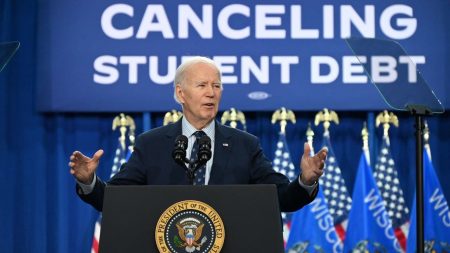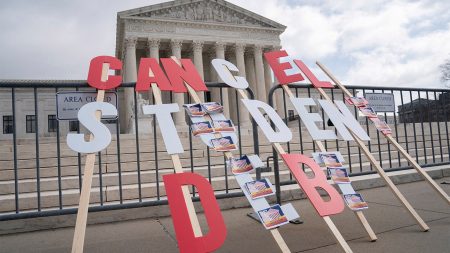
Despite evidence of a growing labor market, many Americans fear widespread job losses, according to a study by Morning Consult.
In fact, 75% of Americans were concerned about widespread job losses, Morning Consult reported. Moreover, 49% worried about job losses in their industry and 39% feared losing their own job, Morning Consult found.
Nonetheless, the U.S. economy saw job growth resilience in April. The economy added 253,000 jobs last month, an increase from the previous month, according to the latest Bureau of Labor Statistics (BLS) data. In addition, the number of job losers and persons who completed temporary jobs dropped by 307,000 in April to 2.6 million, the BLS said.
“Despite all the talk of a looming recession, employers are not being deterred and continue to hire at a rapid pace,” Morning Consult Senior Economist Jesse Wheeler said in a statement.
Many Americans also saw small boosts to their wallets, BLS data showed. Wage growth increased by 0.5%, a slight bump from the 0.3% growth in the previous month, the BLS reported. And in the past 12 months, average hourly earnings increased by 4.4%.
But job growth and higher wages may not curb inflation nor prompt the Federal Reserve to slow down its interest rate hikes, some experts said.
“The inflationary pressures from this strong wage growth will likely prevent the Federal Reserve from cutting rates any time soon, even if they now are at the peak for this rate cycle,” Mike Fratantoni, the Mortgage Bankers Association’s (MBA) chief economist and senior vice president of research and industry technology, said in a statement.
Jim Baird, Plante Moran Financial Advisors’ chief investment officer, said that a larger increase in the unemployment rate would be needed to drop inflation to the Fed’s 2% target rate.
If you’re concerned about the direction of the economy, you could consider cutting down high-interest debt with a personal loan at a lower interest rate. You can visit Credible to get your personalized rate in minutes.
RECESSION FEARS RISE: MORE THAN HALF OF AMERICANS SAY THEY’D LOSE EVERYTHING
Interest rate and inflation uncertainty remain
To curb inflation, the Fed has raised interest rates 10 times since March 2022. In May, the Fed raised interest rates by 25 basis points, pushing the federal funds rate to a targeted range of 5% to 5.25%—its highest level in 16 years.
Inflation increased 4.9% year-over-year in April. And while that’s a drop from its June 2022 high of 9.1%, it’s still far from the Fed’s targeted 2% level.
And it’s uncertain whether the Fed will ease its tightening on monetary policy soon.
“Inflation has moderated somewhat since the middle of last year,” Fed Chairman Jerome Powell told reporters at a press conference. “Nonetheless, inflation pressures continue to run high, and the process of getting inflation back down to 2 percent has a long way to go.”
Nonetheless, any future interest rate hikes may affect what consumers pay on products like credit cards and mortgages.
“For as long as interest rates remain relatively high, consumers are advised to continue to be diligent in keeping their own individual credit profiles in the strongest financial positions they can be,” Michele Raneri, the vice president and head of U.S. research and consulting at TransUnion, said in a statement. “This includes continuing to pay down as much high-interest debt as they are able to, ensuring they have an ability to pay for any new debt acquired, and continuing to maintain a consistent record of on-time bill paying overall.”
If you’re concerned about high-interest debt, you could consider paying it down with a personal loan at a lower interest rate. You can visit Credible to compare options from different lenders, without affecting your credit score.
INFLATION AND INTEREST RATE HIKES ARE NEGATIVELY IMPACTING AMERICANS’ FINANCIAL WELL-BEING: SURVEY
Inflation has taken a financial toll on Americans
Despite strong economic data, inflation has been a major stressor for many Americans, reports showed.
In fact, 61% of Americans said recent price increases have caused financial hardship for their households, according to a Gallup poll. That marked a six-percentage-point increase from the previous reading in November 2022 and the highest since 2021, when Gallup began tracking this metric.
“Even as inflation has been cooling, the effect of continued high prices has broadened the financial pain Americans are feeling,” Gallup said in its report.
“The increases in these readings suggest that the recent slowing of inflation has so far done little to provide relief for Americans, and it may take more dramatic changes in prices for the harmful effects of inflation to subside,” Gallup continued. “The public lacks confidence in economic leaders to tackle the problem.”
Additionally, 70% of Americans said inflation has impacted their finances more than the COVID-19 pandemic, according to a recent survey by Real Estate Witch. And the impact has taken a global hold, one report showed. More than half (74%) of global workers said inflation was the biggest stressor in their lives, according to a report by Fidelity Investments.
“Given all the stresses in the world today, such as natural disasters and geo-political events, Americans continue to confront challenging times in our economy,” said Kevin Barry, the president of Workplace Investing at Fidelity Investments.
If you’re struggling with high-interest debt, you could consider paying it down with a personal loan at a lower interest rate and potentially lower your monthly payments. You can visit Credible to speak with an expert and get your questions answered.
FINANCIAL STRESS HAS BIGGEST IMPACT ON AMERICANS’ MENTAL HEALTH: SURVEY
Have a finance-related question, but don’t know who to ask? Email The Credible Money Expert at [email protected] and your question might be answered by Credible in our Money Expert column.
Read the full article here










